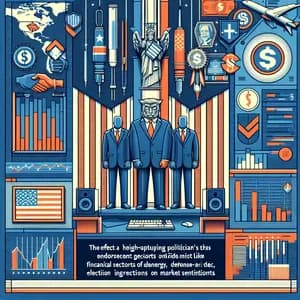Chip Industry's Tariff Crisis: What Investors Must Know Now

The Chip Industry’s Tariff Woes: What Investors Need to Know
As the financial landscape continues to shift in response to rising tariffs and economic uncertainties, the chip industry finds itself in a precarious position. Recent reports suggest that even exempt products from tariffs may not shield companies in this sector from rising costs and declining demand. This situation has profound implications for stock investors, particularly those holding shares in key players within the semiconductor industry.
The Tariff Impact
The imposition of steep tariffs, particularly on imports from China, has created a ripple effect throughout the tech sector. Higher costs for products that contain chips are expected to dampen consumer demand, which could pose risks for companies reliant on strong sales in the electronics market.
Key Players in the Chip Industry
- NVIDIA Corporation ($NVDA): As a leader in graphics processing units (GPUs) and artificial intelligence (AI) technology, NVIDIA is well-positioned to benefit from an expanding market. However, potential tariff impacts on their supply chain could affect margins and pricing strategies.
- Advanced Micro Devices, Inc. ($AMD): AMD is another significant player in the semiconductor space, known for its CPUs and GPUs. The company has been gaining market share, but rising costs associated with tariffs could influence future pricing and competition.
- Intel Corporation ($INTC): Intel, a household name in the chip industry, is also feeling the pressure from tariffs. The company has been investing heavily in new manufacturing facilities, and any increase in costs due to tariffs could affect their capital expenditure plans and overall competitiveness.
- Taiwan Semiconductor Manufacturing Company ($TSM): As the largest contract chip manufacturer in the world, TSMC plays a critical role in the semiconductor supply chain. Any tariff implications could lead to increased production costs that might be passed on to their customers, affecting profitability across the industry.
- Qualcomm Incorporated ($QCOM): A leader in wireless technology, Qualcomm’s business model is heavily tied to the smartphone market, which relies on semiconductors. The potential for increased costs and reduced demand could impact their revenue projections moving forward.
Investor Considerations
For stock investors, the evolving tariff landscape presents both challenges and opportunities. Companies that can adapt to rising costs or find ways to mitigate the impact of tariffs will likely fare better in this tumultuous environment. Conversely, those unable to navigate these challenges may see their stock prices suffer.
Investors should closely monitor the financial health of these companies, paying particular attention to their quarterly earnings reports and guidance as they navigate these turbulent waters. As the market reacts to these developments, staying informed will be crucial for making sound investment decisions.
Read more: The Dip-Buyers Braving the Market During Stocks Carnage Read more: Exempt or Not, the Chip Industry Won’t Escape Tariffs




